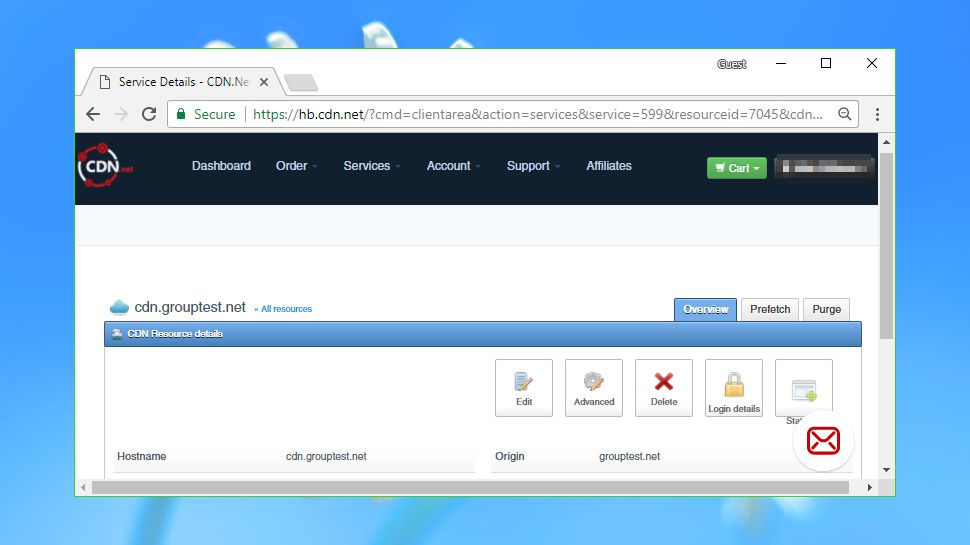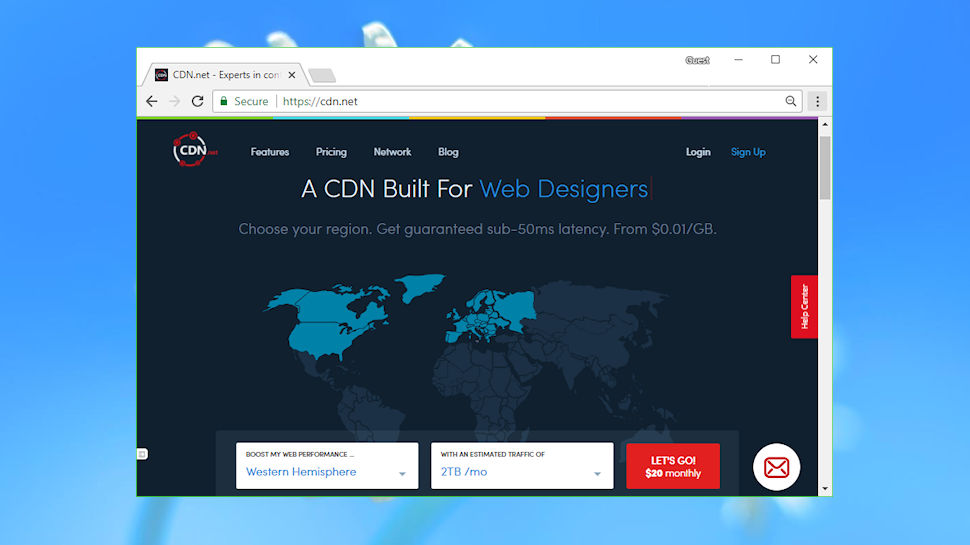TechRadar Verdict
A very basic CDN with few features and some website problems. Don't waste your time.
Pros
- +
Low prices
- +
Free trial
- +
Up to 80 POPs
- +
OnApp can be speedy in some areas
Cons
- -
Very few features
- -
Limited configurability
- -
Poor support website
- -
Dubious low latency ‘guarantee’
Why you can trust TechRadar
CDN.net is a budget content delivery network based on OnApp CDN.
The company sells its service as a ‘low latency CDN’, and the website guarantees sub-50ms latency in the regions you care about. Sounds appealing, although we couldn't find any details of how this guarantee works.
The website doesn't make it clear, and the terms of service appears to say no guarantee is possible: "we are not responsible for the operation of any POP [point of presence] or Capacity... and do not guarantee the quality or performance of any POPs."
The remainder of the service is stripped back, focused on the CDN essentials. There's GZip compression, free shared SSL, DDoS protection, global load balancing, manual cache management, and real-time data on service operations.
CDN.net is built for simplicity and doesn't have the low-level configuration options you'll get elsewhere. Still, experts can take more control by making use of the service API, and in theory there's enough power here to cover basic applications.
Pricing
CDN.net has three plans. The features are the same in each case, and they only vary in price and the number of POPs.
The CDN-X plan offers 30 POPs in North America and Europe. It's priced at $20 (£16) for 2TB, or $0.001 per GB.
Sign up to the TechRadar Pro newsletter to get all the top news, opinion, features and guidance your business needs to succeed!
The CDN-EXEC plan has 60 POPs, adding coverage for the Middle East, Asia and Mexico. The price remains $20 (£16), but the bandwidth you get halves to 1TB, or $0.002 per GB.
The CDN-LUX plan goes worldwide with 80 POPs, and adds support for Australia, South Africa, South America and more. But your bandwidth allowance halves again, with the $20 (£16) price now getting you just 500GB, an equivalent $0.004 per GB.
There are no extra charges for requests, or restrictions on the number of websites your account will support. You just pay a flat rate for bandwidth depending on your chosen plan.
Overall the service seems to be good value, assuming you'll use all your allocated bandwidth. There's a free trial linked on this page which lets you try the service out, although it's not advertised on the main site. It gives you a generous 1TB and 30 days to experiment, more than enough to sample CDN.net's abilities for yourself.

Setup
Signing up for the CDN.net trial starts by providing your name, email address, physical address and phone number. Authenticate your email and the website displays limited instructions on how to set up the service and update your DNS.
A simple web console enables setting up an HTTP CDN by entering your origin and the CDN hostname (cdn.mydomain.com). You can also choose from groups of edge locations, although there's only one option in the trial.
The console isn't as intuitive as it could be, but poke around for a while and you'll discover a small number of more advanced settings.
Access control options enable blocking access to your site by country, IP address or referrer (hotlink protection).
A URL Signing option helps with creating secure links available to authorized users only, for example to download paid content.
You can enable MP4 and FLV pseudo streaming, enabling users to skip forward in a video which isn't fully downloaded. (You'll need a Flash player and a prepared video for this to work.)
Other settings include a cache expiry time, the ability to ignore requests with cookies, and an option to block search engine crawlers.
An unusual experts-only section allows configuring a few low-level Nginx settings (these can be safely ignored by most users).
Elsewhere, simple cache management tools enable configuring individual URLs to prefetch (load into the cache before the first request) or purge. The website suggests purging can take one to two minutes for a single item, up to ten minutes for a full site purge.
This is a very limited feature set, which didn't appear to include any form of reporting. We wondered if a Stats CP button might lead us to some charts, but instead it directed us to a 'Welcome to OnApp' login dialog which didn't recognise our CDN.net credentials.
We checked out the support knowledgebase but this was also very basic. There were few articles, and most were short on detail. For some reason many embedded graphics didn't appear, just showing their file names instead (label.png, manage.png and so on). Even worse, some links to other help pages were broken.
Overall, this doesn't give a good impression of the service. CDN.net isn't powerful enough to appeal to demanding users, but the clumsy interface and website problems suggest it's not a product for beginners, either.

Performance
CDN.net wasn't impressing us so far, but could the service deliver on performance?
Assessing CDN speed is always difficult, even more so in this case as CDN.net doesn't have its own network. It's based on OnApp's CDN, though, so we used the response time data collected by Cedexis to compare OnApp with the highly rated Cloudflare and Amazon Cloudfront.
The results were mixed. OnApp lagged well behind the others in North America, but it was a close third to CloudFront in Europe, came second in South America, and made first place in Asia, Oceania and Africa.
To put that in perspective, as we write CDNPerf rates Cloudflare response times as fourth in Oceania and sixth in Asia. Beat Cloudflare anywhere and you're doing very well.
We also need to be careful. These figures aren't directly applicable to CDN.net, as even its high-end plan doesn't use the entire OnApp network. Still, it does suggest the service may not be the fastest in America and Europe, but is likely to do better in Asia and other areas of the world that competing CDNs often neglect.
Final verdict
Too limited for experts, but with too many potential bugbears and issues for beginners, CDN.net is a weak service which is unlikely to appeal to anyone. Keep looking, there are better CDNs elsewhere.
- We’ve rounded up the best CDNs of 2018

Mike is a lead security reviewer at Future, where he stress-tests VPNs, antivirus and more to find out which services are sure to keep you safe, and which are best avoided. Mike began his career as a lead software developer in the engineering world, where his creations were used by big-name companies from Rolls Royce to British Nuclear Fuels and British Aerospace. The early PC viruses caught Mike's attention, and he developed an interest in analyzing malware, and learning the low-level technical details of how Windows and network security work under the hood.
